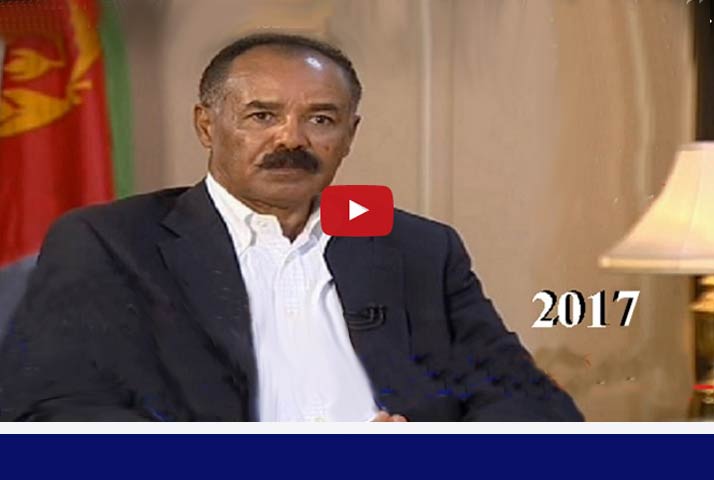Isaias Afwerki: We Were Not Chosen

The fiercest critic of the Government of Eritrea, a guy by the name of Isaias Afwerki, was at it again, mercilessly taking down its 25-year-record of utter failure. This is an annual ritual, presented as an “interview” with Eri-TV; and, if you are asking why would a state-owned TV that doesn’t brook any criticism from anyone allow this, well, you know, it is because the guy is really well-connected to the powerful: he is also the President of the country.
Since every sector of Eritrea’s government is going to be harshly criticized, the only suspense is as to which one will be first in line. Not because things are particularly worse than a year ago in that given sector, but because of which minister is most annoying him at the time of the live interview. He led with energy, particularly electricity, so one of the last holdouts from the Revolution, Ministry of Energy & Mines Minister Sebhat Ephrem, would have every reason to be nervous.
But then again, it probably only reflected Isaias Afwerki’s state of mind on January 27 at 8:00 PM local time.
The Hirghigo Power Plant, said the President, is not dysfunctional because it is old; it is dysfunctional because it was not maintained well and it was in a state of disrepair. We are told this in January 2017. Meanwhile, another guy, reporting from the Belly of the Beast (“Lt Kidane”) wrote at awate.com in 2007 (ten years ago), that this is because some guy (also named Isaias Afwerki) disregarded the advice of the experts and was running the power plant to the ground. This website that you are reading now told you in 2012 that “due to misuse and lack of maintenance, the Hirgigo power plant is running at 25% of its capacity resulting in frequent power outages in the capital…” But then again, so did Kibrom Dafla about Eritrean Airlines; so did Dr. Bereket about Eritrea’s disastrous healthcare system; so did Engineer Fisseha Negus about Eritrea’s useless dams due to Isaias Afwerki’s intrusion. But things didn’t happen until Isaias Afwerki said they happened.
From energy, we move to transportation. Are our problems ancient roads with potholes? Insufficient buses? Yeah, but that is not what’s animating the president. It is that we don’t have enough ships and airplanes. Also, Massawa Airport is a ghost town. But. Way back in 2002, awate.com had told you in The Scandal of Massawa Airport that the Massawa Airport was ill- conceived with no feasibility study at all and poorly executed. But truth is what Isaias Afwerki says it is. When he says it (15 years later), until he says its exact opposite.
From there, it was on to housing and the severe shortage that affects Asmara with half- finished homes littering it. How did that happen? It is all these people with their short-sighted do-it-yourself attitude who forgot that a house needs more than just doors and windows: it needs sewage lines (still using colonial Italian era pipelines) and electricity (refer to the Hirgigo power plant disaster above.) “But, sir, wasn’t it your own government and your own Housing Bank aggressively selling these homes to the criminally-gullible Diaspora Eritreans?”, asked nobody. (Come on, give the “journalists” a break, they don’t want to disappear.) How about all the kiddies with their Photoshopped images about imaginary dream neighborhoods? Like these kiddies? Oh well.
Watching the body language of the State Media interviewers is cringe-inducing. He is always stretched out to occupy maximum space and they are always hunched over to occupy minimum space: a fine display of power dynamics. Then there is the way they address him: “Kbur President.” Back in my day, you used the word “kbur” in addressing someone only when writing a letter for your mother to her distant cousin. Literally, it means “Dear” but I think its practical application here is “Mr.” Still, it must still be jarring to the aging revolutionaries who knew him as “Comrade Isaias” to hear the “Kbur president.”
On to the content. With the body language firmly established–I am powerful and you are one call away from disappearance–with his reputation for losing his temper and occasionally resorting to physical violence preceding him, a protocol is established: the reporters’ questions are essentially nothing more than quoting back to Isaias Afwerki what Isaias Afwerki said years prior and then asking him very meekly for an update. One of them was so terrified and swallowing his words, Isaias had to ask him to repeat the question. Sure it is a question he had been given in advance (as he kept saying we will address this in your next question), and most likely wrote the question himself (he is an expert at everything), but we get our drama where we can find it.
Is repeating to him what he said a year ago and inviting him to give a soliloquy a safe way out? Nope: his contrarian and professorial tendencies take over and he has to begin his answers by contradicting and correcting them even when they are merely repeating what he had said. Let’s say, hypothetically (and no, I am not being hypothetical), the interviewer asks, “the campaign to diplomatically isolate Eritrea has failed, as was witnessed by the developments of 2016….”. The president will begin by correcting the interviewer and saying it was not a campaign to diplomatically isolate Eritrea and in his long answer he will revert back to confirming that it was, indeed, diplomatic isolation.
Motto: confuse friend and foe alike. Keep them off-balance.
One way of keeping them off-balance is to bore them to death. One reason that the interviews are so long is because Isaias Afwerki was absent when they were teaching factoring and distributive property in algebra in middle school. Let me put it this way. Suppose I ask you what can I buy in the two farmers markets in your neighborhood. You would say “you can buy fruits and vegetables.”
This is how Isaias Afwerki would put it:
“If you go to the market, (and whether we have a market or not is a big subject that we can discuss at length), you can buy fruits and vegetables, if the speculators have not marketed the corner (which is also a huge and deep subject which we can discuss had it not been for the limitations on time.) When you go to the first Farmer’s Market, you can buy oranges and lemons, (I like to call it citrus), peaches and water melons, and apples and farawla, [which is a word I translated from Arabic for strawberries: marvel at my vocabulary and the words I invent]. And when it comes to vegetables, you can buy, spinach, and carrots and onions and tomatoes (although some say that is not a vegetable but fruit which is a huge subject.) When you go to the second Farmer’s Market, you can buy oranges, peaches and lemons, and water melons, and apples and strawberries. As for vegetables, you can buy spinach and carrots and tomatoes and onions….”
This keep-them-on-their-toes-or-bore-them-to-death strategy sometimes enters the twilight zone when he replaces a word by its synonym and says “I call it….” (iye zblo ane.) When he was asked about the Eritrean constitution, he began by saying “I call it governmental system.” You may be asking: but the 1997 Eritrean constitution was called Qwam, what happened? Read on: choosing the phrase “governmental system” (“sr’Ate mengisti”) in lieu of constitution (“Qwam”) was only when discussing the proposed Eritrean constitution. When discussing Ethiopia’s constitution of 1994-95, which he is still angry about because his advice for unitary state was not taken seriously, he forgets the iye zblo ane synonym and he reverts back to “Qwam.”
Then (pay attention now Atlantic Council and all the propagandists who actually think President Isaias Afwerki is actually drafting a constitution), he takes us to the market and tells us what he is selling, and it is not a constitution that will introduce rule of law in Eritrea. Nope. It is a road-map (godena meriH) for perpetual hegemony of the ruling party, PFDJ.
It goes like this: Eritrea will be organized vertically: the Red Sea Area (North & South Red Sea), the Central area (the Eritrean highlands all the way up north to most of Anseba region), and the Western zone (Gash-Barka and parts of Anseba.) Each command center, I mean economic zone, will have its national security, intelligence, police, border patrol, PFDJ office, and civilian administrators. This identical structure will be, god help us all, replicated in the Eritrean Diaspora (the Americas, Europe, Middle East, Africa.) Each one will have a Coordinating Committee, and each one of these will report to some central unit of PFDJ, Inc.
So, a question about the constitution-drafting process ended up being an answer about the re-organization of PFDJ, told without the benefit of the Distributive Law of algebra. It was explained in the manner I explained above about what you can buy at a market.
Then came the issue of raises for civil servants and the education system. Let’s pause for a second now and remember that children as young as 16 are separated from their parents to go to the single high school in the country which also happens to be a military camp in Sawa. So, every year, 15,000 Eritreans take the high-school-leaving exam and, at most, 5,000 meet the minimum requirements (GPA) to pursue their education further in diploma and degree programs. What about the other 10,000 students a year who are done with compulsory education every year? Well, if I have them join the armed forces, you accuse me of enslaving them. If they leave the country, you accuse me of exiling them. I am trying to come up with certificate programs to teach 1 year or shorter vocational courses, but that requires teachers and resources which I don’t have….
[Author: I am paraphrasing. I paraphrase when I am sympathetic to the challenge.]
So, to deal with this issue, I am prioritizing them (recent college, university graduates) over all others when it comes to who is first in line to get the raises. Why not use seniority and experience, asks the interviewer. Because the priority is how do you buy off the most potentially politically active, came out a thought bubble followed by Dear God, am I the only politician in town?
This naturally begs the question: Dear Leader, now that you have misdiagnosed Eritrea and prescribed solutions that won’t work, and haven’t worked for 25 years, could you also misdiagnose the world and tell us what’s going on?
Gladly, little people. Well, of course, this is a deep and broad subject. But the short version is the story you have heard every year in every interview:
Eritrea’s independence in 1991 coincided with the end of the Cold War. Then came these two American thinkers, Fukuyama and Huntington, proposing a Unipolar World led by the United States, which would rule the world, unchallenged for the next 50 years. This vision of hegemony and domination requires having anchor states, and obedient servants of which Ethiopia is one….and all the wars we saw from Afghanistan to Iraq, to Somalia, to Libya, Syria and all the Arab Spring were the direct outcome of this misguided and arrogant policy.
To begin with, Fukuyama was never for US hegemony (except for the brief period he lost his mind and was a signatory to the Project for New American Century in 1997.) Fukuyama is most famous for arguing the end of History (capital “H”) has arrived: an epoch when the entire world has agreed that the values of liberal democracy and free markets are the best choice. This is standard stuff (Marx believed that there would be a time when communism would triumph over all forms of economic systems) and the prevailing view after the fall of the Berlin Wall.
But more importantly, by 2003, Fukuyama had come to understand that culture is more important than ideology and had broken from the neoconservative movement and the US hegemonic view, and this is really, really important point: Isaias Afwerki believed in US hegemony LONGER THAN FUKUYAMA did. When Fukuyama was expressing his doubts about whether the US role in Iraq was positive, President Isaias Afwerki was lobbying the United States really hard to establish a base in Eritrea.
Towards that end, Gen. Tommy Franks, commander of U.S. Central Command, visited Eritrea four times in 2002 and met with Eritrean officials. Towards that end, Sebhat Ephrem sent a letter to the US offering Eritrea as a US base. Towards that end, Isaias Afwerki sent a letter to the US leaders congratulating them for their military action in Afghanistan. Towards that end, the then-Eritrean ambassador to the US (the late Girma Asmerom) said, “We are perfect for America; we have deepwater ports for its navy, mountains very similar to those in Afghanistan that can be used for training purposes and airfields that can accommodate its aircraft.” Towards that end, Isaias Afwerki wrote a letter inviting the United States: “I believe that the U.S. has no choice but to play a pivotal role….The matter cannot certainly be relegated to regional actors–Ethiopia, Kenya or Djibouti.” Towards that end, the late Girma Asmerom explained that Eritrea is a better base than Saudi Arabia to launch sorties to Iraq because the Saudis population doesn’t like US soldiers in its country. Eritrea could also serve a launching point for a future attack on Iraq: “You could do it easily from Eritrea and only have to ask for fly-over rights from the Saudis.” (Source for all the quotes above) Finally, it was towards that end (US hegemony) that Isaias Afwerki said, “I share the strategic view of the Americans in the region. French forces in Djibouti have been a stabilizing factor, and U.S. troops will add to that. You need outside powers to keep order here. It sounds colonialist, but I am only being realistic.” (Source)
You cannot spend years lobbying to be the servant (“khedami”, in the parlance of Isaias Afwerki) of the United States, failing, and then blaming those who succeeded (Ethiopia) of being servants. Well, you can, but only with those who have short memories or whose paycheck requires them to have short memories. My view of people with short memories was expressed memorably by the great American rockers Tool in their song Ænima (and yes it is obscene, so if you are offended by poetic lyrics that are not G-rated, don’t click the link.)
Now here’s something newsworthy, the only one in the painfully long and pedantic interview: for the first time, Isaias Afwerki, sorta admits that he had attempted to be a servant for US hegemony and failed: the word he uses is “ayteHarenan”: we were not chosen. Not we didn’t want to. But we were not chosen. So, all we are talking about here is a foreign policy based on “Fatal Attraction”: Eritrea was a curiosity for the US; Eritrea was smitten by the US, and when the US spurned Eritrea, Eritrea felt ignored (“I am not going to be ignored!”) and went on some bunny-boiling adventure. Except the bunny here is the poor Eritrean people.
Of course, Isaias Afwerki perfectly understands those with US hegemonic powers. He doesn’t understand the Merkels and the Hollandes because they are too weak. But he understands the hegemonists because, after all, he is one: he is trying to build a hegemony for his ruling party and he is grooming his son, Abraham Isaias Afwerki, to head it, all the while talking about the evil of corruption. No wonder Transparency International just ranked Eritrea as one of the most corrupt in the world: because political corruption is just as horrific as economic corruption.
And, oh, yes, for those of you who like the Red Meat of Eritrean Ultra-Nationalism, Isaias Afwerki said that Ethiopia is in intensive care. Same thing (exact phrase) he said in 2005, but I surely hope him repeating it in 2017 (12 years of being wrong) will soothe you.
You can join me in the discussion forum (stop by the donate page in the feet of your road – egre megedkum) and we will speculate why Isaias Afwerki is, all of a sudden, talking about Eritrea’s major transportation challenges being lack of local air flights and ships.



Awate Forum